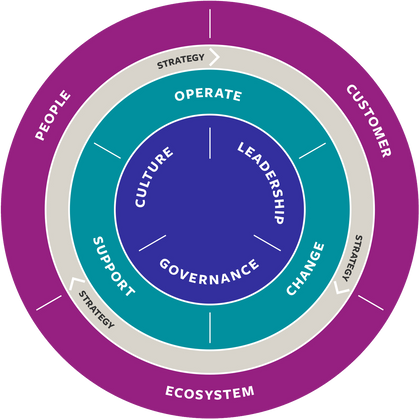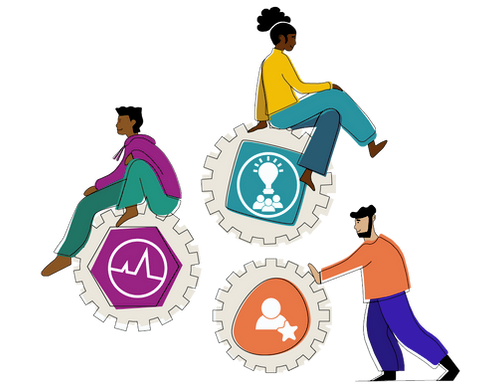What is Business Agility?

Business Agility is an organisational competency that enables businesses to deliver value to customers, employees, shareholders , and society in an increasingly unpredictable, changing world.
It balances “being agile” through culture, leadership, and governance with “doing agile” in delivery. This combination, powered by collaborative and creative ways of working in empowered teams, enables the organisation to pivot strategically when needed and continuously deliver value to all stakeholders. “Being agile” and “doing agile” work together, with strategy connecting the organisations internal capabilities to external value creation.
Since business agility is a competency, this competency can be effected at multiple levels: at team level, at enterprise level, at a departmental level, at a change programme level. The organisational competency therefore is scalable.
Business Agility is explicitly not another framework to implement but a mindset and competency which will be developed through continuous learning. True business agility means the entire organisation operates as an interconnected network of empowered teams focused on creating customer value, not a hierarchy focussed on internal processes.
Here's the paradox: organisations need strong foundations to enable agility. But these foundations aren't set in stone. They evolve deliberately, providing stability through continuity rather than rigidity. This allows an organisation to pivot without losing identity, innovate without chaos, and transform while maintaining trust.
The evidence confirms what practitioners know: organisations with strong business agility report better revenues, happier customers, better engaged employees, and genuine resilience when disruption hits. It's how organisations become the best version while creating lasting value for everyone who depends on them.
What is an Agile Organisation?

An agile organisation responds quickly and effectively to opportunities and threats in its environment, while creating sustainable value for customers, employees, shareholders, and society.
It achieves this through the interplay of strong yet evolving foundations (culture, leadership, and governance) with dynamic delivery capabilities (operations, support, and change management). This enables the organisation to:
- Adapt rapidly to market shifts while maintaining strategic direction
- Respond to customer needs through empowered teams and collaborative networks
- Lead purposeful change that delivers results without sacrificing quality or people
- Build lasting resilience rather than just competitive advantage
- Learn and evolve continuously through experimentation and adaptation
An agile organisation isn't defined by the frameworks it uses but by how it thinks and acts. It operates as an interconnected network of empowered teams rather than a rigid hierarchy. It balances what must remain relatively constant (purpose, values, core capabilities) with what must stay fluid (methods, processes, structures). This creates an organisation that can pivot without losing its identity, innovate without creating chaos, and transform while maintaining the trust of all stakeholders.
Becoming an agile organisation cannot be a purpose. Wanting to become the best organisation it can be, given its specific circumstances, might be the goal. Business agility might be helping to achieve that, if the organisation wants to thrive and survive in our changing world.
Want to know how to become an agile organisation? Read our article about an appropriate place to start your journey.
Membership
Become a member to access essential tools, expert insights, and a network of support through our communities and
specialised groups, empowering you to work smarter, lead confidently, and transform your project delivery.


